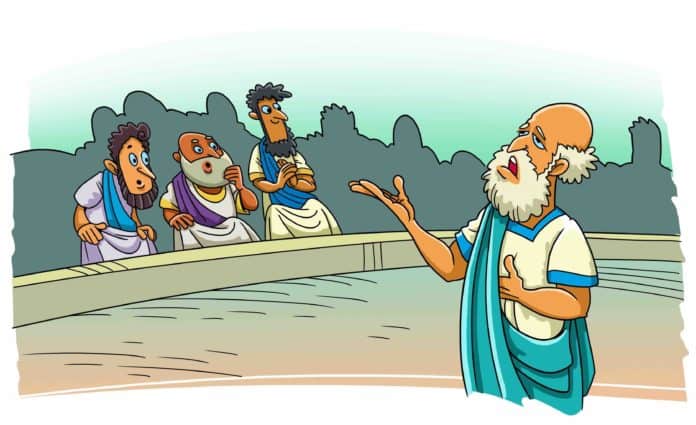This blog was inspired by morning coffee. There is nothing quite like a nice hot cup of coffee in the morning to perk up your mental faculties and get you thinking philosophically. Sometimes between sips you feel as if you somehow have it all figured it out…
But what exactly is it that you are trying figuring out? Sometimes it all seems too complex to boil any of it down into even one simple thought. Well, it was Socrates that said, “The only true wisdom is in knowing you know nothing.”
You might then ask, “Well, then why bother thinking about anything?” Good question. Let’s take a roundabout trip exploring that question starting with the basics…
What Is Philosophy?
The word philosophy comes from two greeks words: philean (to love) and sophia (wisdom). So, if you are a philosopher you are a “lover of wisdom.” In some sense, everyone is a philosopher.
Although many people prior to the Greeks were certainly concerned with topics related to philosophy, philosophy as a formal school did not begin until this time. The origins of philosophy can be traced back to Thales of Miletus who was born in 640 B.C. Thales of Miletus did not allow myth to rule his world view and instead focused on a more scientific way of looking at the world. Thales, and the rest of the “pre-Socratics,” as they are called, then gave rise to Socrates, Aristotle, Plato, etc.
The goal of the first philosophers was to try to understand the “bigger questions” and the world around them using reason and observation. Thales himself focused on topics such as the earth’s composition, the soul and astronomy. Although many of the ideas during this time were inaccurate, some were spot on. In fact, Pythagorus, one of the pre-Socratics (and the one who gave us one of the most memorable of all mathematical theorems), figured out that the Earth is round.
Other discoveries by philosophers during this time (pre-Socratics and slightly beyond):
- Anaxagoras: A kind of molecular theory of matter
- Leucippus and Democritus: Universe is composed of small particles called “atoms”
- Heraclides: Rotation of Earth about its axis
- Eratosthenes: Proves round Earth as well as calculates its tilt and circumference (with surprising accuracy)
- Aristarchus of Samos: Heliocentric model of the solar system
- Seleucus of Seleucia: Links tides to the moon
These are just a few examples of the sort of things philosophers at this time got right about the world around them.
More Than Just What You Can See
However, philosophers do not just dwell on natural phenomena like the above. Some of the types of questions philosophers ask are:
- Do we have free will?
- Is there a God?
- Is there an afterlife?
- What is truth?
- Does life have a meaning or purpose?
- Why do people suffer?
- Is there really good and evil in the world?
- What is the difference between humans and animals?
- What does it mean to live a good life?
These types of questions are questions that people still wrestle with even today. Many people even wonder if we don’t have answers to these major philosophical questions then why even bother with them? Even one of the most renowned intellectuals of the 21st century, Stephen Hawking, proclaimed “philosophy is dead.”
“Philosophy is dead. Most of us don’t worry about these questions most of the time. But almost all of us must sometimes wonder: Why are we here? Where do we come from? Traditionally, these are questions for philosophy, but philosophy is dead. Philosophers have not kept up with modern developments in science. Particularly physics.”
-Stephen Hawking
However, what people underestimate, Mr. Hawking included, is how much of an impact philosophy and philosophical questions have on their lives. Another problem is that whether or not you want to think philosophically about life you already do. You can steer away from those thoughts or even try to hide from them but ultimately there will be real consequences to your actions. Furthermore, even the idea of not wanting to think about these topics is in itself a philosophy.
Many people hold philosophies without the realization of the fact that they do. The great Socrates who got us thinking about this whole question of whether or not it was even worth asking the big questions in the first place also said, “The unexamined life is not worth living.”
So if people ultimately already hold philosophies why is examining those philosophies worth doing?
A Philosophical Parable
Well, think about it this way… Let’s say you had a choice of living in two towns, let’s call them Thoughtlessville and Ponderville. In Thoughtlessville the citizens have no concept of the word neighbor. They do not know what it means to be a good neighbor and do not have any laws regarding proper conduct of how you are to treat one another. In Ponderville the concept of neighbor is paramount. The town was built on the concept of neighbor, everyone is constantly talking about what it means to be a good neighbor and the laws in the town are designed with the concept of neighbor in mind.
One citizen noticed in Thoughtlessville that his neighbor started throwing his trash into his backyard. He, in turn, started to throw trash into his neighbor’s backyard. Before long both neighbors had stinking heaps of trash piled up in their backyards. As this continued and the piles grew larger, the other citizens in the town started noticing a putrid smell. Soon they all had to walk around with cloths over their noses and mouths just to get around the town without smelling and breathing in the awful stench.
The citizens in Ponderville, however, did not have this problem. In fact, there was a law on the books stating that trash must be stored in a trash receptacle. They even decided to pay a community tax for a weekly pickup of this trash to be taken to another area and buried underground so no one would have to endure the smell. It was even illegal to throw any trash outside or into another neighbor’s lawn. They decided that having these types of laws and systems were part of being a good neighbor.
Tiring of the stench, it was not long before some people in Thoughtlessville started thinking. They were thinking perhaps those in Ponderville might know a thing or two. Little by little citizens of Thoughtlessville started taking busses over to Ponderville to try to take up residence. It wasn’t long before Thoughtlessville was left completely empty and Ponderville became a booming and thriving place to live.
This small example, an obvious exaggeration, is not too far from the truth of the matter. There are still some people today who do not take seriously the concept of being a good neighbor. What do you think the consequences are of this type of thinking?
Philosophy Puts You in the Driver’s Seat
The way you live is directly impacted by how you think. How you think is ultimately driven by your philosophy, whether you are aware of it or not. Would it not be better to be aware of it? Would you like to have control over your philosophy or shape it so that it could give you? Or, would it be better to cover your eyes and hope you somehow walk in the right direction?
Philosophy is not dead. For some reason, however, there are some people who are intent on trying to destroy it or, at the very least, veering people away from it. This is like burying your head in the sand. This will have real consequences and unfortunately ruin many lives.
Where Do You Want to Live?
Philosophy not only dwells on the topics of how to be a good neighbor but also what makes a good society, a good world and a good life. Would you like to end up like the citizens of Thoughtlessville who ended up paying for their mistakes the hard way? Or, on the other hand, would you like to live in Ponderville and embrace philosophy in order to stave off problems before they occur?



